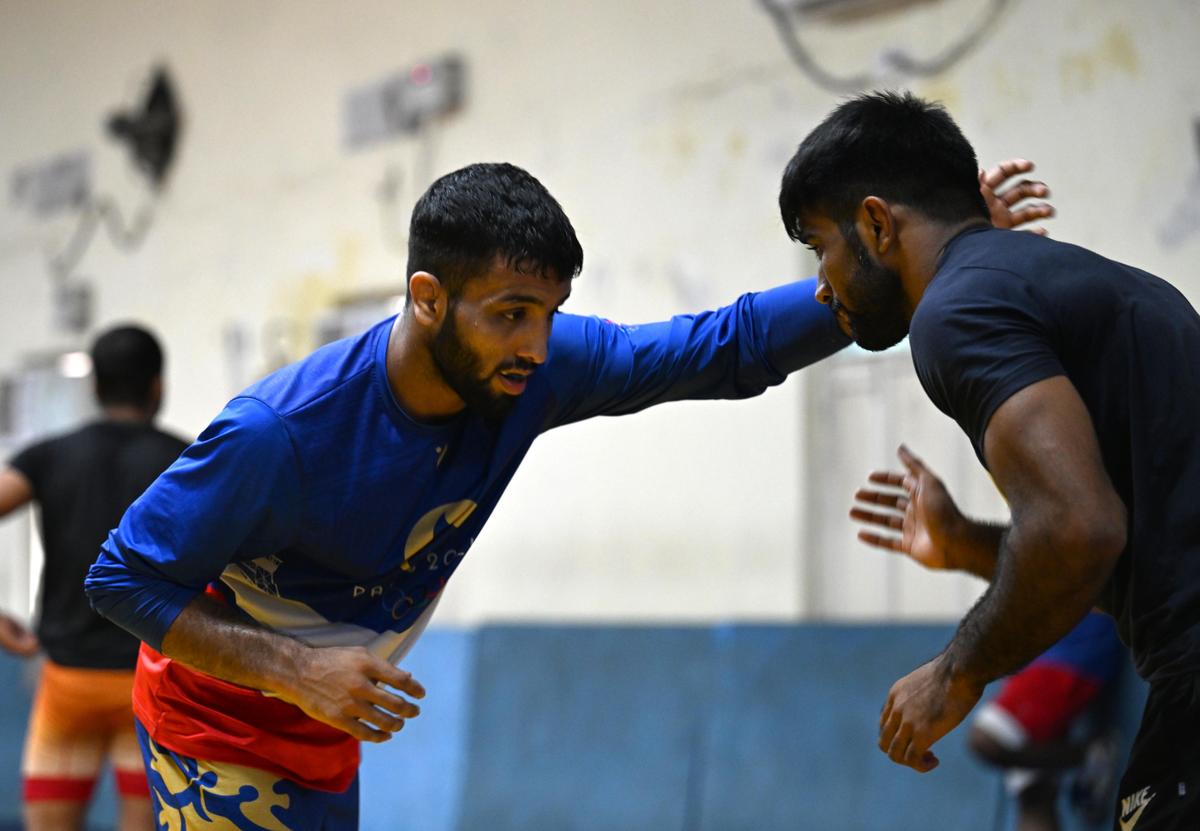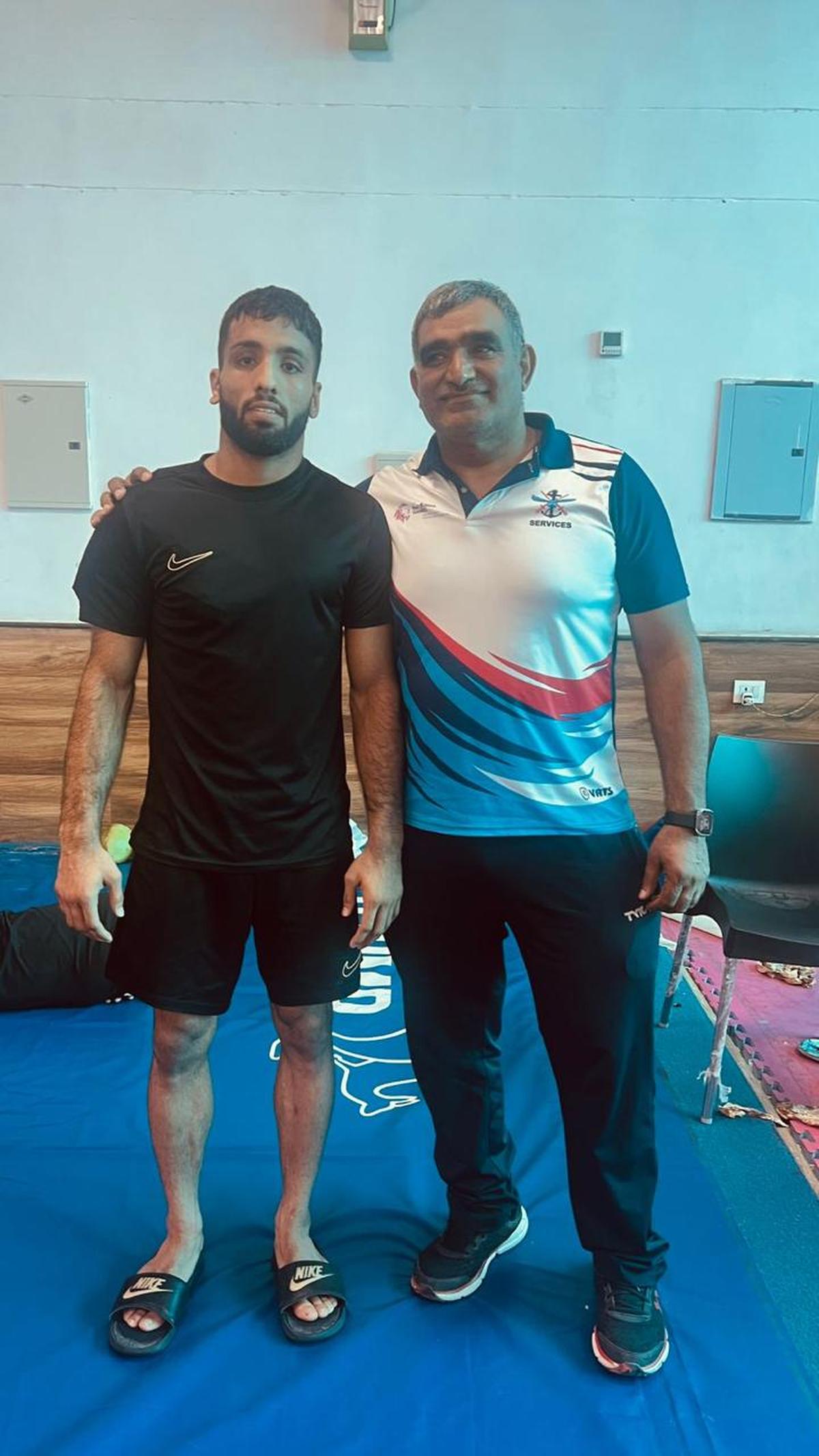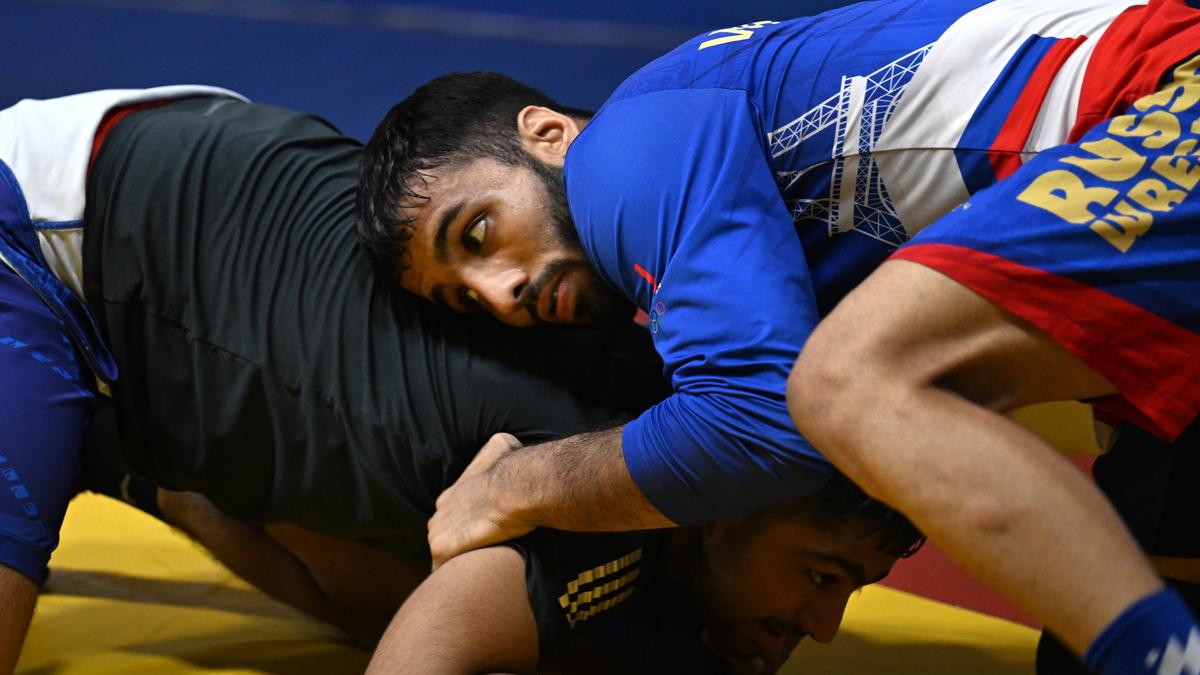Sujeet Kalkal wrestles back from senior Worlds disappointment to win U-23 title
On Monday morning, a few hours before he was to wrestle in the final of the 65kg men’s freestyle division at the Under-23 World Championships in Novi Sad, Serbia, Sujeet Kalkal called his coach in Sonipat, India. “I was telling him to just give his best and not worry about the outcome, but Sujeet was very confident. He wasn’t worried about the final,” says coach Kuldeep Singh Sehrawat.
The lack of nerves might seem surprising given Sujeet’s opponent, Umidjon Jalolov of Uzbekistan, was in red-hot form, having won a senior world bronze earlier this year. But for Sujeet, the Uzbek wrestler wasn’t a serious threat. He had wrestled Jalolov twice at the U-23 Asian Champs earlier this year, winning 10-0 on both occasions.
What gave the 22-year-old even more confidence was that, by all accounts, he had already overcome his two toughest challenges of the tournament — against two-time U-23 World Champion Bashir Magomedov of Russia and former junior World Champion Yuto Nishiuchi of Japan in Sunday’s quarterfinals and semifinals. Both bouts went down to the wire, with Sujeet scoring in the dying seconds to come back from behind — 4-2 against Magomedov and 3-2 against Nishiuchi.
Sujeet’s confidence wasn’t misplaced. In a technically flawless performance that ticked every box in defence and attack, he scored 10 unanswered points against Umidjon to win by technical superiority, with a minute and six seconds still left on the clock.
He became only the third Indian men’s wrestler to stand atop the podium at the U-23 Worlds. While Olympic bronze medallist Aman Sehrawat and Chirag Chikkara had previously claimed gold in the 57kg category, Sujeet’s triumph was India’s first in the marquee 65kg men’s freestyle. Bajrang Punia, who won four senior world medals and an Olympic bronze in Tokyo, had managed only silver in this category at the 2018 edition.
Sujeet still has some way to go to emulate his illustrious predecessor, but the signs are promising.
The U-23 gold capped a solid international season for him. Although Sujeet made his senior debut for India in 2024, it was this year that he became a regular feature in the national squad for every major event.
After an injury forced him to retire in the second round of the Asian Championships, Sujeet bounced back by winning gold at the U-23 Asian Championships and then defeating Paris Olympics bronze medallist Islam Dudaev en route to the top of the podium at the Hungarian Ranking Series. That result established him as a serious contender for a medal at his debut senior World Championships.
Sujeet shared that belief. “My goal is to medal at both the senior and U-23 World Championships this year,” he had told Sportstar earlier in the season.

The unorthodox route Sujeet has taken in his wrestling career has had an impact on the kind of wrestler he is.
| Photo Credit:
RV MOORTHY
The unorthodox route Sujeet has taken in his wrestling career has had an impact on the kind of wrestler he is.
| Photo Credit:
RV MOORTHY
Disappointing Worlds
At this year’s senior World Championships in Zagreb, Croatia, Sujeet came close to upsetting Paris Olympics silver medallist Rahman Amouzad of Iran before losing 6-5 in the quarterfinals. That was the tightest contest of Amouzad’s campaign — the eventual world champion did not concede more than a single point in any other bout. But Sujeet finished outside the medals, losing to Real Marshall Woods of the USA in repechage.
“It was hard because he went into the tournament thinking he was going to fight for gold. And after he nearly beat the Iranian, people around him started saying that no one else had a chance. And then against the American, he lost a match that he should have won,” says coach Kuldeep.
ALSO READ | U-23 World Wrestling Championships: India’s medal tally up to seven as Hansika, Sarika clinch silver
It then fell to his coach and father, Dayanand, to keep Sujeet motivated for the U-23 Worlds. “I had to keep reminding him that this world championship was not the end. There are going to be other chances. I reminded him of his goals — to become World Champion and Olympic champion. The U-23 World Championships had to be a stepping stone for that. It was important for him to do well,” says Dayanand.
Those ambitions might seem lofty, but Dayanand, himself a former international wrestler who competed in the Greco-Roman category at the 2005 World Championships, believed his son was capable of them.
Atypical preparation
Sujeet’s development has followed an unconventional path. Unlike many elite Indian wrestlers, his early career wasn’t filled with medals at the cadet (U-17) or junior (U-19) levels — a deliberate choice, says Dayanand. “A lot of Indian wrestlers have very good results at the cadet and junior levels but get burned out by the time they get to the seniors. I just wanted Sujeet to learn the sport and understand it first. Kushti karwane aur sikhane me farak hai. (There’s a kind of wrestling you do when you want to learn the sport and there’s a kind of wrestling you do when you have to win.) While Sujeet was in school I just wanted him to learn,” Dayanand had told this publication earlier this year.
While learning the sport, Sujeet also focused on academics, scoring over 90 per cent in his Class 12 exams. He even considered preparing for the JEE before realising that wrestling, not engineering, was his true calling.
That’s when he moved to Sonipat to train under coach Kuldeep, who recalls the youngster standing out for his intelligence. “He didn’t have any big results at the age-group levels for two reasons. One, he was balancing studies and sports. Two, unlike many junior athletes, he never changed his age to gain an unfair advantage. But his best quality was how quickly he picked up things. He started training at our academy in 2021, and within five years, he’s one of the best wrestlers in India,” says Kuldeep.

Sujeet Kalkal and his coach Kuldeep Singh Sehrawat.
| Photo Credit:
SPECIAL ARRANGEMENT
Sujeet Kalkal and his coach Kuldeep Singh Sehrawat.
| Photo Credit:
SPECIAL ARRANGEMENT
The unconventional route Sujeet has taken has shaped the kind of wrestler he has become. “Most of the top Indian wrestlers have a game built on tiring out opponents. That’s because their training is designed to build stamina. When I watch someone like Bajrang pehelwan, it’s really exciting because he wrestles for all six minutes, and even if he’s trailing, you always know he’ll wear his opponent down and come back at the end,” Sujeet told Sportstar earlier. “It’s fun to watch but I can’t wrestle that way. From the start, I was drilled on technique. Even now I’m more of a technical wrestler.”
That was precisely the kind of wrestling Sujeet displayed at the U-23 Worlds. Across five bouts, he conceded only a single takedown (against Fiodor Ceavdari of Moldova). The only points scored by Nishiuchi and Magomedov came through step-outs and passivity calls.
Defensive acumen
“What I liked most about his wrestling in this tournament was how strong he was defensively. He didn’t give opponents many chances to score and even when they attacked, Sujeet didn’t concede much,” says Kuldeep.
But Sujeet did more than defend. In the final, he showed sharp counterattacking instincts against an increasingly desperate Abdulaev, but some of his best moments came in the wins over Magomedov and Nishiuchi, when he executed match-winning takedowns in the final seconds of the bout. “Sujeet showed that he had that explosive takedown ability late in the fight. He’s able to keep fighting and keep his energy late in the fight. That knowledge that he can score when he gets the smallest opportunity even late in a bout does a lot to boost a wrestler’s confidence,” says Kuldeep.
Kuldeep believes those are invaluable qualities. “He has all the right tools in place. There’s no glaring weakness in his game. He can still improve his physical strength, but that will come with age. He will also refine his technique and gain experience. I don’t think this is the best he’s capable of. A U-23 World result isn’t the biggest title in the sport, but after what happened at the senior Worlds, it will give him the confidence that he belongs at the elite level,” he says.
Dayanand hopes that confidence translates into bigger things next year. “Winning the U-23 World Championships is good but we have the World Championships and Asian Games next year. That will be the real test. But the ultimate goal is the Olympic Games in Los Angeles. That’s the medal that matters,” he says.
Published on Oct 28, 2025



